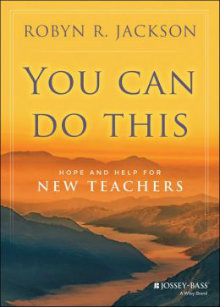Hope, Help and Wisdom for Novice Teachers
You Can Do This: Hope and Help for New Teachers
By Robyn R. Jackson
(Jossey-Bass, 2014 – Learn more)

Bound nicely within the pages of You Can Do This: Hope and Help for New Teachers, the 10 chapters offered by Dr. Robyn R. Jackson include personal stories, wisdom, professional advice, anecdotes and direction for novice teachers.
Although the book is targeted to first year teachers, experienced educators and newly appointed administrators can also benefit from reading its documentation of the progression of a novice teacher’s experiences through the lens of an accomplished instructional leader, Jackson herself.
In You Can Do This, the most recent of her nine books, Jackson captures the struggles and emotions that most teachers experience in those first and formative years of professional practice. She shares personal stories and offers a sophisticated perspective of her own professional journey as well as a collection of collegial wisdom she gathered along the way.

Harnessing individual strengths
Jackson asserts that there is no one-size-fits-all wisdom that works for educators. Success in the education profession is not tied to shortcuts or gimmicks; instead, Jackson advises new teachers to let their personalities shine through their work, to be aware of and understand their own individual strengths and weaknesses, and to harness those strengths.
As Jackson points out, students, being socially intuitive individual learners, can differentiate between the teachers who are the real thing and the fakers. Over the course of the text, Jackson makes a compelling case for teachers to personalize instructional methods to fit their own unique style as well as the needs of students. In doing so, according to Jackson, teachers will inevitably be happier in the profession, while authentically engaging students with meaningful experiences they can believe in.
Jackson devotes entire thematic chapters to developing a personal teaching style, finding balance between work and home, planning, working with parents, classroom management, and leadership. The author illuminates each theme by sharing personal stories and letting her readers know that as professionals, teachers can still present themselves in their own unique manner by applying a personalized touch to the craft and practice of teaching.
A life beyond the classroom
Unlike multiple-choice assessments, teachers need not be standardized. For example, newly licensed teachers need to know that it is okay to let one’s personality shine through, as long as professionalism is not compromised. Jackson also emphasizes the importance of having a life beyond career.
She describes how a colleague once scolded her for assigning homework every night, as she inevitably would have to grade the additional busy work. Seeing little to no progress resulting from her students’ performance of these tasks, Jackson complied with the advice of her colleague and found the experience to be liberating to the point of rejuvenating her energy, ultimately making her a more responsive and attentive educator by focusing efforts on the quality, not quantity, of assignments and assessments.
Similarly, another teacher provided an important revelation to Jackson early in her career. A fellow English department member advised her to draw clear lines between personal life and work. Noticing the stack of papers Jackson lugged to and from school every night, she stopped Jackson at the door one evening and told her to avoid taking work home, to reserve home as a respite from school, to stay a little later at school in the evenings if need be, but avoid taking work home at all costs.
Jackson took the advice of her colleague and discovered that drawing clear lines between work and home facilitated professional productivity and personal happiness.
Collaboration with colleagues and parents

When Jackson contacted this father by phone, she reported that he was upset to the point of being verbally abusive over the phone. However, Jackson listened attentively to his concerns and without interruption she allowed him to continue his denunciation of the school and school personnel. When he finished venting, Jackson reports that he then thanked her for listening to his concerns and promptly ended the call.
A few hours later, when the father reported to campus and signed his son out of school for the afternoon, much to the surprise of school staff he was pleasant and cordial, which was the opposite behavior that teachers and administrators had witnessed in the past. He actually thanked Jackson for listening to his concerns.
Jackson devotes an entire chapter to illustrating the priority of school-to-parent communication and finding common ground. As the author demonstrates through her stories, both school and parents have the same objective: student success. However, differing philosophies may cloud the relationship between school and home. She emphasizes the importance of being a good listener. Further, Jackson asserts that not every problem needs an immediate solution, although it is important to tune-in to parents, especially when concerns are voiced.
Continuing your professional growth
Robyn Jackson closes her book by illustrating the importance of professional development, her area of expertise. She provides a motivational narrative calling for new teachers to embrace professional development opportunities and to grow and eventually develop into strong instructional leaders for their students, schools, and districts.
You Can Do This: Hope and Help for New Teachers is a well-written retrospective account of a teacher’s personal and professional journey from novice to instructional leader. Jackson’s writing style is uniquely personal. Reading this book is similar to having an ongoing conversation with a near and dear mentor.
At a fast-paced 192 pages, the book is a valuable resource and a quick read for busy professionals. I encourage new teachers to read this book, as they will find perspective and calming advice amidst the high pressure and challenging times of our profession.
In addition, newly appointed administrators, mentors and instructional coaches should also read this book as it will facilitate professional self-reflection and assist in connecting to the perspectives of novice teachers.
Jason Gordon, EdS. has over 16 years of professional experience as a counselor, special education teacher and school administrator. Gordon has also served as a new teacher mentor and was selected as 2011-2012 Teacher of the Year by his colleagues. Currently, Gordon is a Ph.D. student and Graduate Teaching Assistant at the University of Tennessee, Department of Theory and Practice in Teacher Education, where he conducts research, teaches and supervises pre-service teacher interns.

































